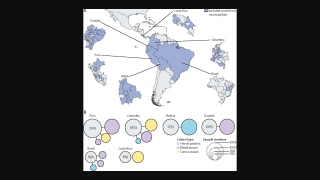Chikungunya Vaccine is Approved, Zika has Vaccine Candidates, But Oropouche is Lacking

Recent experiences with the introduction of Chikungunya and Zika viruses to the United States could foretell what might occur with the Oropouche virus because all three arboviruses are maintained in an urban cycle between humans and arthropod vectors.
Both Chikungunya and zika viruses are transmitted by Aedes (Stegomyia) mosquitoes, which oviposit and develop in containers in and around homes. This makes persons more susceptible to mosquito exposure and, ultimately, infection.
In contrast, the primary Oropouche vector, the biting midge, is low-abundance in North America and primarily resides in tree holes in the southeast and midwestern U.S., says the U.S. CDC Emerging Infectious Disease, Volume 30, Number 11—November 2024.
As of October 7, 2024, local transmission of the Oropouche virus had not been reported in the United States, although 92 cases have been reported in travelers, primarily arriving from Cuba.
Cuba is in the midst of its peak rainy season, which is associated with increased vector abundance. This suggests that more travel-associated cases might be expected in the U.S., in particular, Puerto Rico.
The U.S. CDC wrote on October 1, 2024, that various factors are likely to affect the risk of the local spread of the virus, including the rate of introduction from travel-associated cases, the presence and distribution of the vectors and potential host reservoirs, and potential virus adaptation.
Should the virus infect wild bird populations in North America, it is possible that the Oropouche virus could become endemic, similar to the progression of the West Nile virus, says the CDC.
While Chikungunya has one approved vaccine and several Zika vaccine candidates are progressing in clinical research, Oropouche vaccine research is in its early stages in 2024.
Our Trust Standards: Medical Advisory Committee








